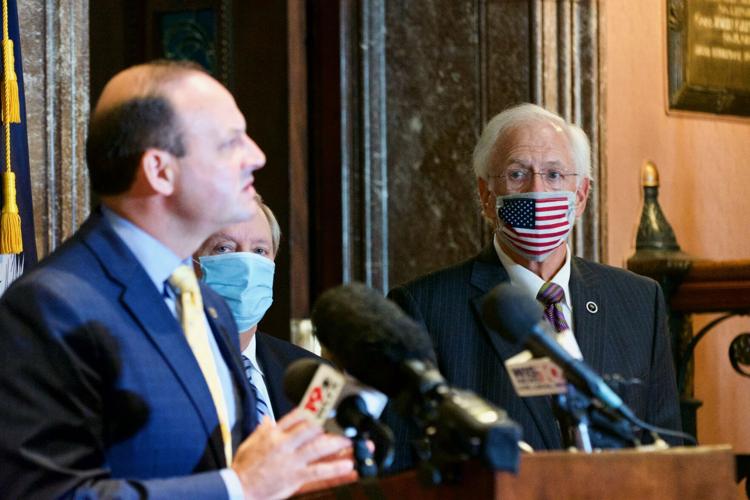

U.S. Secretary of Energy Dan Brouillette listens to U.S. Sen. Lindsey Graham, a South Carolina Republican, speak Monday at the the Statehouse in Columbia.

State Rep. Bill Taylor, R-Aiken, right, looks on as S.C. Attorney General Alan Wilson speaks to reporters Monday at the Statehouse.
COLUMBIA — A monumental agreement has been struck between South Carolina and the federal government, namely the U.S. Department of Energy, concluding a years-long standoff and resolving expensive litigation over the long-term storage of plutonium at the Savannah River Site south of Aiken.
Terms of the deal include a DOE promise to remove from South Carolina 9.5 metric tons of plutonium by 2037, years ahead of prior projections, and an upfront $600 million payment from the Trump administration – the single largest legal settlement in the Palmetto State's history.
The money, to arrive in a few weeks, is sourced from a national judgement fund, effectively circumnavigating a preoccupied and deadlocked Congress. U.S. Attorney General William "Bill" Barr signed off on the move, officials said.
Should the cache of plutonium not be removed by Jan. 1, 2037, fines against the Energy Department, among other things, will be reinstated.
A senior Energy Department official said the common ground found was "more satisfactory" than what was statutorily called for.
Metric tons of plutonium are kept at the Savannah River Site, about 80 miles southwest of Columbia, at a retrofitted reactor complex known as K-Area. Its keeping and handling there has been controversial. The material is toxic and radioactive and is a key component of nuclear weapons. Plutonium has also been used to fuel deep-space vessels.
The high-wire accord, months in the making and recently polished, was unveiled Monday morning at a Statehouse ceremony featuring S.C. Attorney General Alan Wilson, U.S. Secretary of Energy Dan Brouillette and other elected officials.
"The Trump administration is committed to tackling our nation's toughest challenges where previous administrations have failed," Brouillette said, "including the removal and disposal of Cold War-era plutonium from the state of South Carolina."
He added: "This is a good day for South Carolina."
Wilson, a Republican who has openly and repeatedly sparred with the DOE, emphasized his and his team's "long-term commitment to preventing South Carolina from becoming a dumping ground for nuclear waste." It's a remark similar to one employed by opponents of Yucca Mountain in Nevada, and has often been applied locally by lawmakers like U.S. Sen. Lindsey Graham, R-S.C.
Asked by the Aiken Standard how the plutonium would be removed or where it would go, Brouillette suggested the plans are not yet finalized. But, he continued, the material could be processed and sent to southeastern New Mexico for burial at the Waste Isolation Pilot Plant, an approach known as dilute-and-dispose; could be staged elsewhere at another Energy Department facility; or could be utilized in a nuclear reactor.
Together, it's a grand effort to be shared by the National Nuclear Security Administration and Environmental Management, the Energy Department's nuclear remediation office. The two agencies already operate at SRS.